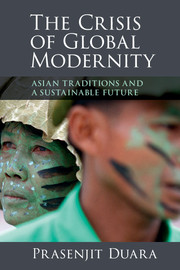Book contents
- Frontmatter
- Epigraph
- Contents
- List of figures and maps
- Preface and Acknowledgements
- Introduction
- 1 Sustainability and the crisis of transcendence
- 2 Circulatory and competitive histories
- 3 The historical logics of global modernity
- 4 Dialogical and radical transcendence
- 5 Dialogical transcendence and secular nationalism in the Sinosphere
- 6 The traffic between secularism and transcendence
- 7 Regions of circulation and networks of sustainability in Asia
- Reprise and Epilogue: of reason and hope
- Bibliography
- Index
- References
Reprise and Epilogue: of reason and hope
Published online by Cambridge University Press: 05 January 2015
- Frontmatter
- Epigraph
- Contents
- List of figures and maps
- Preface and Acknowledgements
- Introduction
- 1 Sustainability and the crisis of transcendence
- 2 Circulatory and competitive histories
- 3 The historical logics of global modernity
- 4 Dialogical and radical transcendence
- 5 Dialogical transcendence and secular nationalism in the Sinosphere
- 6 The traffic between secularism and transcendence
- 7 Regions of circulation and networks of sustainability in Asia
- Reprise and Epilogue: of reason and hope
- Bibliography
- Index
- References
Summary
As I thought about hope, I suddenly became fearful. When Runtu had wanted the incense burner and candle stand, I had secretly laughed at him: he could never forget his idols. But is the hope that I now cherish also not an idol? Only his was within easy reach, mine was remote and harder to reach.
In the twilight, a stretch of jade green sand opened up beyond the sea in front of my eyes. Above in the deep blue sky there hung a golden moon. I thought hope is not something that can be said to exist or not. It is just like a road on the ground. On the ground itself there is no road, it is made only when many people walk on it.
Lu Xun, “Guxiang” (“My Old Home”)This study has developed several interrelated arguments and I present them in their bald form, throwing caution to the winds, for the reader to assess them and their relationships to each other.
The model of modernity and modernization based on conquest of nature and driven by increasing production is no longer sustainable. The crisis it has created cannot be adequately addressed by the existing system of competing nation-states and heroic histories of national progress, but only by recognition that our histories are shared and our destiny, planetary. Archaic histories tended to merge their linear representations of community with cosmological and universal ideals, while contemporary histories have yet to join theirs with the cosmic imperatives of our times. These histories need to be guided by circulatory realities that index our common belonging in a battered and ever more fragile planet.
- Type
- Chapter
- Information
- The Crisis of Global ModernityAsian Traditions and a Sustainable Future, pp. 279 - 288Publisher: Cambridge University PressPrint publication year: 2014

